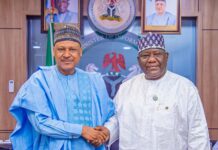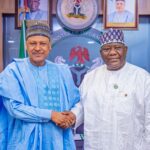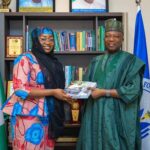Lagos State Governor, Mr. Babajide Sanwo-Olu, has projected that the total investments in the agricultural sector in the State would run to $10B in the next five years with the formal launch of its five-year Agricultural and Food Systems Roadmap, adding that most of the investments would be private sector-driven while the government acts as the catalyst and enabler.
He noted that Lagos could no longer afford to rely exclusively on other States for its food, adding that it was time to unlock its immeasurable agricultural potential through the implementation of the five-year roadmap.
Governor Sanwo-Olu opined that the Roadmap would also lead to wealth generation, value creation, food security, the industrialisation of the agricultural sector and the entrenchment of inclusive socio-economic development of the State.
According to him, the roadmap essentially focuses on three pillars, which are: growth of the upstream sector, growth of the midstream and downstream sectors as well as improvement of private sector participation.
His words: “Our strategies for sustainable Agricultural Development shall focus on three pillars. First, we will grow the upstream sector through interventions by leveraging technologies that are capable of lowering the cost of production of value chains; Focus on growing the midstream and downstream sectors that are of value and lastly, we will improve on private sector participation by developing and initiating policies that will encourage more private investments in agriculture”.
“The projection is that the total investment in the Agricultural Sector from the government, private sector, donor agencies and development partners will run into over $10 Billion in the next five years. While we expect most of the investment to be private sector-driven, government will continue to provide the needed infrastructure while the private sector will be encouraged to lead the key projects”, Sanwo-Olu noted.
He assured that the State would formulate policies to encourage private sector investment in agriculture, while providing robust market information systems for Agricultural Value Chain actors to adequately plan and circumvent risks and uncertainties.
The Governor pointed out that the State had already started the revamping of its Agricultural Land Holding Authority (ALHA) to support investment in agriculture, giving assurance that the coconut belt would also be strengthened with increased private sector involvement.
Sanwo-Olu listed some landmark investments that the State has begun and would help with the smooth delivery of the Roadmap, such as the Lagos State Aquatic Centre of Excellence (LACE) that would boost fish production from 20% to 80%; the Imota Rice Mill; the Lagos Food Production Centre Avia, Igborosu-Badagry as well as other Statewide agriculture-focused initiatives.
“I am greatly encouraged by the interest already generated in the Five-Year Agricultural Roadmap and I hope it will be sustained and backed with concrete action on the part of our development partners and the international community. I assure you that the Lagos State Government is putting in place deliberate incentives to make your investment safe, secure and profitable”, he averred.
Sanwo-Olu, therefore, urged potential and established stakeholders in the agricultural sector to partner with the State in order to transform the agricultural sector for food security, wealth generation, poverty eradication, economic diversification, rapid industrialisation and accelerated socio-economic growth.
Speaking earlier, the State Commissioner for Agriculture, Ms. Abisola Olusanya noted that the Roadmap was a brainchild of the Agricultural Stakeholders’ Summit, which was held at the inception of the administration of Mr. Governor, where several issues of importance relating to agriculture and food security were discussed.
According to Olusanya, private sector partnerships and involvement would go a long way in driving the Roadmap to fruition, stating that investment in the transformation of agriculture to agribusiness is one way of achieving the dream of attaining self-sufficiency in food production.
In the same vein, the Commissioner for Finance, Dr. Rabiu Olowo, opined that agriculture currently generates less than 2% of the State’s GDP, stressing that the establishment of an Agricultural and Food Systems Roadmap to drive in more investments and create wealth was a highly welcome idea.
He, therefore, urged all stakeholders in the agriculture sector to work together to ensure the success of the Roadmap.



















